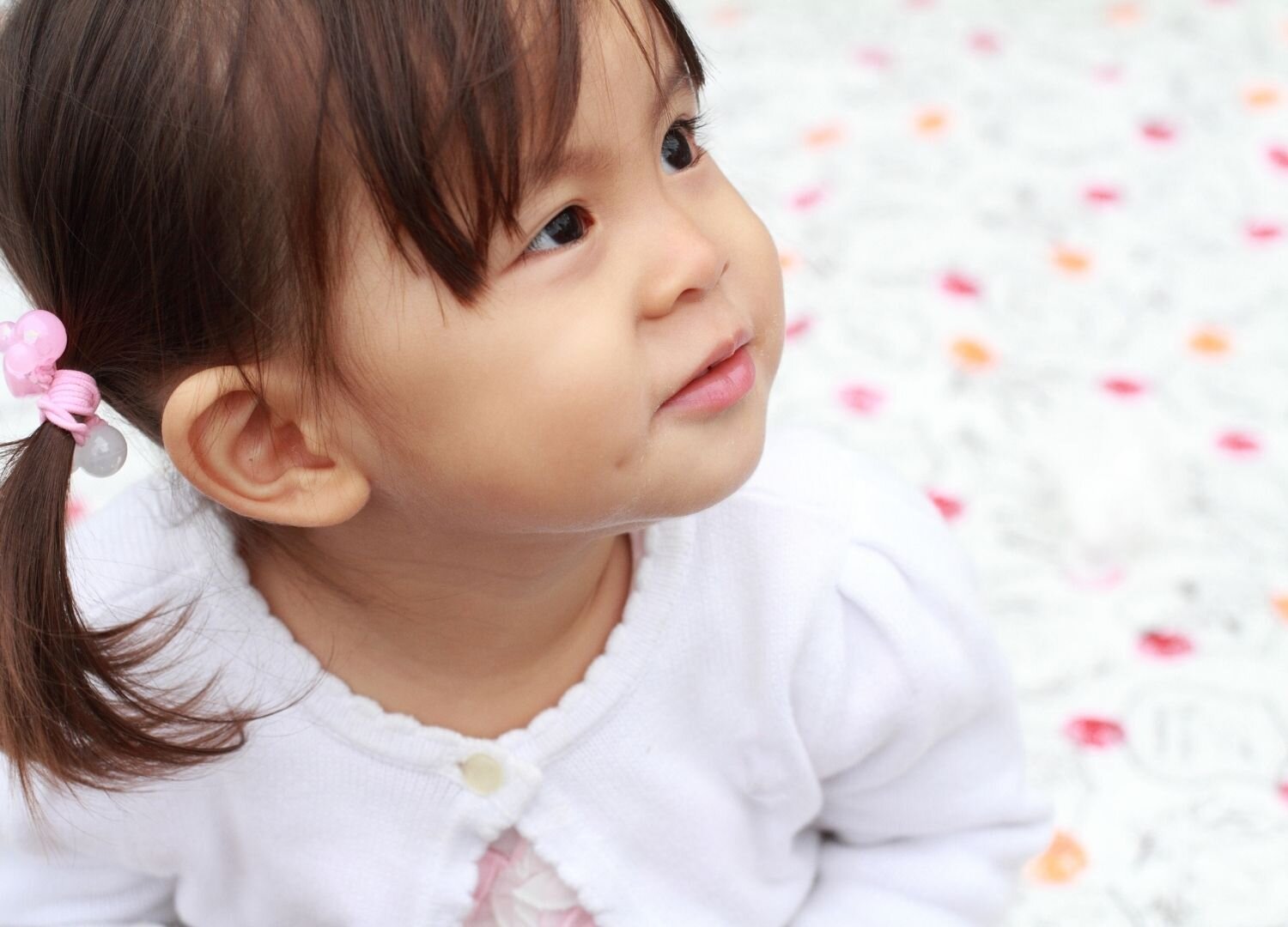Everything You Need to Know About Your Baby's First Words
What counts as a first word? How can you help your child say words? Today I'm demystifying the development of verbal language!
Your child is starting to show the early signs of talking, and it’s such an exciting time. You hang over the coos and babbles, wondering what might come next.
At times, you hear something that makes you pause. It sounds like a word.
Did he just say ‘Mama’?
Was that ‘baby’?
Am I so hopeful that I’m hearing things?
Parents sometimes expect their baby’s first words to come clear as day, but the water’s actually a bit murky. As a speech therapist, one of my goals is to help families understand how to determine whether or not their child’s exclamations can be counted as “first words.” Another goal is to implement strategies that will help a child achieve them!
What is a First Word?
When we’re debating qualifications (Is this a word or not?), we’re thinking carefully about meaning, context, consistency, and spontaneity.
Specifically, consider these questions:
Do you see evidence that your child is assigning meaning to the sounds coming out of his mouth? Does he look at you expectantly as if he is trying to tell you something? Or does he simply appear to enjoy the act of producing the sounds?
Does he only say ‘Mama’ when in his mother’s presence? Does he say ‘Da” specifically when he sees the family dog? Or does he make these vocalizations when he is by himself, too?
Do you notice your child saying the same sounds in the same way repeatedly? Or do his vocalizations change frequently?
Does your child say these words spontaneously? Or is he saying them only in imitation?
Please note: A first word counts even if it’s not pronounced perfectly! In fact, kids’ first words may only approximate adults’ pronunciations of the same words.
In short, if you hear your child spontaneously saying something that appears to have meaning, is appropriate to the context, and is used consistently, it’s likely he’s saying his first words.
Yay!
When Do Babies Say Their First Words?
A little one will typically begin saying words around the time they turn one. If you’re not yet hearing vocalizations that meet the qualifications described above, don’t panic.
Your child engages in lots of important work before saying words to prepare for this milestone!
The Evolution of First Words
Prior to first words, your little one is learning all about the components of verbal language (aka speech) by listening to you and practicing. He’s experimenting with breathing and resonance. To do so, he’s using his lungs and vocal folds (vocal chords). And then he’s learning to make many tiny muscle movements to position his lips, jaw, tongue, and other articulators for the production of a single speech sound. Not to mention the skills required to put two sounds together.
It’s hard work! And it takes time
Development varies from child to child. Still, typical development in the evolution towards first words follows a general timeline. Here’s what you can expect: (1)
Between birth and 3 months, a baby produces vowel-like sounds. He cries when upset and begins to coo when happy.
From 4-6 months, a baby begins to babble, often starting with ‘pa,’ ‘ma,’ and ‘ba’ (all sounds produced with two lips together). He begins to combine the same two sounds, repeating syllables (e.g., ‘ma-ma-ma’). We refer to this as reduplicated babbling.
At 7-12 months, a baby begins combining different syllables (e.g., ‘ma-pa-da’). We refer to this as variegated babbling. Sometimes, early first words are incorporated into babbles. At this stage, a child’s intonation will often reflect the intonation of adult speech.
By 12-15 months: first words appear with increasing frequency!
By 15-18 months, a child’s vocabulary is accelerating quickly. You’ll see more and more words during this time.
18-24 months: A toddler’s vocabulary continues to grow, and fast! Word combinations appear.
Common First Words and Why
When it comes to first words, variants of ‘Mama’ and ‘Dada’ most often take the cake. Words related to favorite toys, foods, and pets are other popular choices.
First words are not selected randomly, so if you think you hear your child saying ‘Mississippi’ at 11 months, think again.
Babies often start with words that are meaningful and relevant to their everyday lives. They tend to choose words that describe people, items, and actions. (2)
My Child Doesn’t Talk Yet; Where Should I Start?
If your child has turned one and isn’t showing signs of first words, start by getting strategic in your home! Speech and Language at Home’s 50 First Words handout makes it easy.
Attribute Meaning to Vocalizations
Do you hear babbles from your little one that sound like first words but aren’t? React as though the babbles have meaning –– and someday, they might! For example, if you hear your child babbling “ma-ma-ma-ma,” point to yourself and say “Mama!” Then clap in celebration.
Choose Target Words and Visuals
The handout shares 50 common words to target as well as forms to plan weekly words and take notes. Also included are the signs for each word! Signs may help children who learn visually and empower them to communicate even before speech is available to them. Physical items and pictures also support a child’s learning.
Build Therapy into Daily Life
To take advantage of therapeutic opportunities throughout your day, get creative and mindful! The more times you expose your child to a word, the more likely he is to master it. The 50 First Words handout comes with lots of tips for daily activities that are perfect for targeting each word. Repeat them often, and practice throughout the day.
Keep Track
Monitor your child’s progress! Our handout includes a checklist and a chart, which allow you to count the words you hear over time. Our Early Intervention Notebook contains even more comprehensive documentation tools. Consider these informal assessment resources. Keeping track of first words may help you learn whether your little one’s development is on track. It can also help you determine which strategies are working (and which aren’t). Information is power!
Be Patient
I understand how badly you want to hear your child talking! It can be challenging to stay patient. But keep in mind that pressure will not speed up the process. It might even work against you! Avoid constantly putting your little one on the spot and forcing him to repeat words.
First Words Still Aren’t Coming?
If your family is struggling, remind yourself of all the ways your child may already be communicating, even if he’s not communicating verbally. Think about supplementing with picture cards to reduce frustration. And consider reaching out to a speech therapist in your area for professional support.
Remember: practice makes progress.




